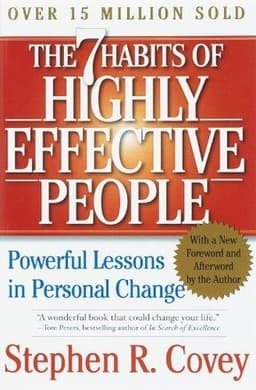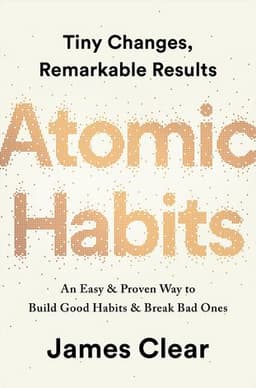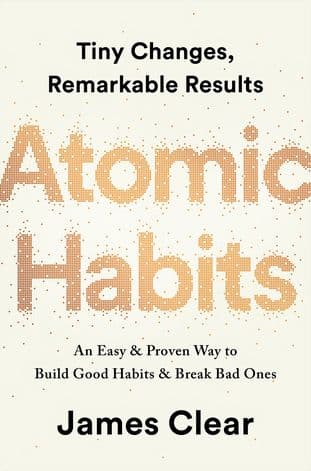
7 Habits of Highly Effective People Book Summary
Powerful Lessons in Personal Change
Book by Stephen Covey
Summary
The 7 Habits of Highly Effective People is a powerful framework for personal and interpersonal growth, teaching principles of character, vision, integrity, collaboration, communication, and renewal. By adopting these habits, readers learn to take proactive charge of their lives and continually invest in their greatest asset - themselves.
Sign in to rate
Average Rating: 2.33
1. Paradigms and Principles
The Key To Success Lies Within
In the opening section, Covey explains that achieving lasting success and happiness requires looking inward rather than seeking quick-fix solutions. He argues that real change and growth come from examining and adjusting our own character, paradigms and motives. This "inside-out" approach is more difficult than just treating symptoms, but leads to deeper, more meaningful improvement.
Section: 1, Chapter: 1
Paradigms: The Lenses We See The World Through
Covey defines a paradigm as the lens or map through which we interpret the world. Our paradigms are often unconscious but profoundly shape how we perceive and interact with reality.
- We can have paradigms about ourselves, others, and life in general
- Paradigms can be accurate or inaccurate representations of reality
- Faulty paradigms lead us to misinterpret situations and interact ineffectively
- Shifting to more accurate paradigms allows us to see the world more objectively and make better choices
Section: 1, Chapter: 2
Which Glasses Are You Wearing?
Covey shares an impactful example of how paradigms shape perception. He presents the famous optical illusion showing both a young woman and an old woman.
Depending on their initial paradigm, people only see one woman or the other at first. Even when guided to look for the other woman, many struggle to shift their perception. It's only when they persist in changing their mental frame of reference that they can finally see the other image.
This demonstrates how powerfully our paradigms filter reality and how difficult it can be to see things from a different perspective, even when that perspective is clearly pointed out to us.
Section: 1, Chapter: 2
Personality vs Character Ethics
Covey argues that there are two contrasting approaches to success - the "personality ethic" and the "character ethic."
The personality ethic focuses on:
- Developing superficial skills and techniques
- Public image and seeking to influence others' perceptions
- Short-term thinking and treating symptoms rather than root causes
In contrast, the character ethic prioritizes:
- Inner growth and aligning actions with universal principles
- Authenticity and staying true to one's deepest values
- Long-term development and addressing underlying drivers of effectiveness
While aspects of the personality ethic can be beneficial, Covey asserts that neglecting character in favor of personality ultimately leads to unsustainable, unsatisfying "success."
Section: 1, Chapter: 2
2. Private Victory
Habit 1: Being Proactive Is The Foundation Of Effectiveness
Covey describes proactivity as the first and most basic habit of highly effective people. Being proactive means:
- Taking responsibility for your life and choices, rather than blaming circumstances or others
- Focusing your time and energy on what you can control (your Circle of Influence) rather than worrying about things you can't (your Circle of Concern)
- Taking the initiative to make things happen instead of waiting to react to external events
- Listening to your inner values and making value-based choices rather than getting caught up in moods or impulses
Proactive people shape their own lives; reactive people are shaped by external forces. Developing proactivity is essential because the other habits depend on the ability to act based on principle rather than reacting to circumstance.
Section: 2, Chapter: 3
"The Most Important Investment We Can Make Is In Ourselves"
"The most important investment we can ever make in life - investment in ourselves, in the only instrument we have with which to deal with life and to contribute."
Section: 2, Chapter: 3
Writing A Personal Mission Statement
Habit 2: Being with the End in Mind.
To begin implementing Habit 2, set aside time to work on crafting your personal mission statement. This process allows you to define success for yourself and outline your unique principles and priorities. Covey recommends including:
- Character traits you want to embody and values you want to exemplify
- Contributions and achievements you want to focus on in various roles (family, work, community, etc.)
- A statement of purpose - what you want to accomplish and the impact you want to have
A good mission statement serves as your personal constitution - a stable inner compass to guide your decisions and actions. It's essential to invest in developing your mission statement since it becomes the foundation for the other habits.
Section: 2, Chapter: 4
All Things Are Created Twice
A core concept from Habit 2 is that all things are created twice - first mentally, then physically. For example:
- A building is constructed twice - first through architecture plans, then through actual materials
- A company is built twice - first in a business plan, then in actual operations
The same concept applies to our personal lives and goals. Taking time to mentally create your life is key to achieving the outcomes you desire. If you don't make a conscious effort to visualize who you are and what you want, you risk letting others and circumstances determine your life by default.
By developing a mission statement and envisioning success as described in Habit 2, you take charge of your own first creation. Managing from this blueprint allows you to more effectively handle the second creation - the actual experience.
Section: 2, Chapter: 4
Habit 3: Putting First Things First
Habit 3 is the practical fulfillment of Habits 1 and 2. While the first two habits establish your overall life leadership, Habit 3 zooms in on personal management - how you handle day-to-day time demands based on your self-knowledge and mission.
Key practices of Habit 3 include:
- Identifying and focusing on activities that align with your mission, roles and goals (Quadrant II activities)
- Proactively scheduling time for important-but-not-urgent priorities
- Consciously choosing to say no to unimportant activities, even if they seem urgent
- Balancing production (getting results) with building your capacity to produce (self-care, learning, relationship-building, etc.)
Effective Quadrant II organizing involves defining clear roles and goals, then scheduling weekly and daily tasks to accomplish them. By adopting Habit 3, you ensure that your moment-by-moment behavior is guided by your deepest priorities.
Section: 2, Chapter: 5
How To Handle A Full Email Inbox
Covey offers an example of how to apply Quadrant II thinking to a common situation - handling an overflowing inbox.
A Quadrant I reactive approach would be diving in and starting to answer emails as quickly as possible, putting out fires as they arise. You might stay afloat, but you'd likely spend all your time reacting to urgent demands without making progress on key priorities.
In contrast, a Quadrant II proactive approach might look like:
- Stepping back to define what outcomes you need from your email management system
- Setting aside time to organize emails based on importance/urgency and your mission
- Establishing a cadence for responding to different types of emails so progress doesn't depend on constant monitoring
- Identifying emails/tasks that could be delegated or eliminated to free up time
- Communicating proactively to senders about your email practices to manage expectations
This type of Quadrant II, principle-centered approach trades off reacting quickly in the moment for a sustainable system that consistently produces better results.
Section: 2, Chapter: 5
3. Public Victory
Six Paradigms Of Human Interaction
Habit 4 introduces six paradigms of human interaction. These represent alternative approaches to working with others, with varying degrees of effectiveness:
- Win/Win: Seek mutual benefit in all interactions. Aim for solutions that allow both parties to succeed.
- Win/Lose: See life as a competition. Pursue your own interests at others' expense.
- Lose/Win: Sacrifice your desires to accommodate others. Give in to keep the peace.
- Lose/Lose: Seek to hurt those who have hurt you. Engage in mutually destructive behavior.
- Win: Get what you want, but don't necessarily seek others' loss. Focus solely on your own interests.
- Win/Win or No Deal: Aim for mutually beneficial outcomes, but have the wisdom to walk away if no win/win solution can be found.
Of these options, Win/Win and Win/Win or No Deal are the most effective long-term paradigms. Both require integrity, maturity and an Abundance Mentality to build trusting relationships. The others ultimately lead to poor results and damaged connections.
Section: 3, Chapter: 6
Win/Win Agreements Turn Implicit Expectations Into Explicit Commitments
One of the most practical ways to implement a Win/Win paradigm is developing Win/Win Agreements. These agreements transform fuzzy expectations into concrete deliverables, creating clarity and buy-in on both sides. Covey outlines five key elements:
- Desired results: What specific outcomes are we trying to achieve?
- Guidelines: What parameters will guide our efforts?
- Resources: What financial, technical or human resources can we draw on?
- Accountability: How will we evaluate results? When will we check in?
- Consequences: What do we expect to happen as a result of achieving (or not achieving) the desired results?
To put this into practice, think of an upcoming project or collaboration. Take time upfront to discuss these five elements with all involved. The process of making expectations explicit often uncovers hidden misalignment. It also equips everyone to hold themselves and each other accountable for success.
Section: 3, Chapter: 6
Listen First To Understand, Then To Be Understood
Habit 5 holds that the key to effective communication is empathic listening - deeply understanding the other person's perspective before sharing your own. This is challenging because we tend to:
- Listen autobiographically, filtering everything through our own experiences
- Listen selectively, hearing only parts of the conversation
- Listen with intent to reply, preparing a response rather than focusing on the speaker
- Listen to facts and words, but miss the meaning and feeling behind them
To practice empathic listening:
- Mimic content: Repeat back the speaker's words to capture what they said.
- Rephrase content: Summarize their message in your own words.
- Reflect feeling: Verbalize the emotions you hear behind the words.
- Rephrase and reflect: Combine steps 2 and 3 - "You feel X because Y."
When others feel deeply understood, they become far more open to understanding your perspective in return. Seek first to understand, then to be understood. Make the listener feel heard before sharing your views.
Section: 3, Chapter: 7
Synergy Is The Pinnacle Of Communication And Collaboration
Habit 6 moves beyond respectful communication to true creative cooperation. When you have healthy Habits 4 and 5, you create an environment where synergy can occur.
Synergy means the whole is greater than the sum of its parts. It's the fruit of mutual respect and understanding. Key aspects include:
- Building on each others' strengths to reach new solutions
- Collaborating on the basis of trust rather than contract
- Achieving unified diversity by valuing differences
- Using a 3rd Alternative approach that emerges from collective creativity
Synergistic teams produce results that transcend what any individual could accomplish alone. Differences become strengths rather than obstacles. Combined perspectives yield insights that no one initially brought to the table.
Achieving synergy isn't easy - it takes commitment to the Win/Win paradigm and to seeking understanding. But groups that operate synergistically tap into the highest level of creativity and productivity.
Section: 3, Chapter: 8
4. Renewal
Sharpening The Saw
Habit 7 focuses on continuous improvement and renewal in the four key dimensions of life:
- Physical: Caring for your body through exercise, nutrition, sleep and stress management. Keeping yourself healthy and energized.
- Spiritual: Clarifying values, committing to a higher purpose, drawing on sources of peace and inspiration. Provides leadership and meaning to your life.
- Mental: Ongoing learning, developing new skills, staying curious and engaged. Expands your competence and wisdom.
- Social/Emotional: Building relationships, practicing empathy and collaboration, contributing to others. Enhances your sense of connection and influence.
Renewal in each dimension builds your capacity to practice all the other habits more effectively. Just as a machine requires maintenance to keep functioning, your most valuable asset - you - requires deliberate upkeep. By "sharpening the saw" through balanced, proactive self-care, you avoid burnout and increase your impact.
Section: 4, Chapter: 9
"The Only Person I Have the Ability to Change is Myself"
"Anytime we think the problem is 'out there,' that thought is the problem. We empower what's out there to control us. The change paradigm is 'outside-in' - what's out there has to change before we can change. The proactive approach is to change from the 'inside-out': to be different, and by being different, to effect positive change in what's out there."
Section: 4, Chapter: 10
Make Small Commitments And Keep Them
Covey emphasizes the importance of integrity in the little moments of life. He shares the story of teaching his son about the power of commitments:
Covey gave his seven-year-old son the responsibility of taking care of the family yard. He walked him through the expectations, got his son's buy-in, and agreed on consequences for not following through.
After initial reminders, the son started taking full ownership for the task. On his own initiative, he pulled weeds, worked hard in the summer heat, and kept the yard in great condition.
Later, Covey asked him, "How'd you do it?" His son replied, "Well, Dad, it was just like you said. I was the boss of myself."
Covey's simple agreement with his son proved more motivating than constant reminders or punishments. It helped his son develop internal discipline and responsibility.
We can apply this in our own lives by making and keeping small commitments with ourselves. Over time, these build our integrity and empower us to stay disciplined in major life priorities.
Section: 4, Chapter: 10
Centering Life On Timeless Principles
Covey argues that sustainable effectiveness requires centering our lives on universal, timeless principles rather than short-term gains or external forces.
He illustrates this idea through the Principle Center, contrasting it with alternative life centers:
- Family centeredness: Seeing everything in terms of impact on family; neglecting other priorities
- Money centeredness: Defining success and motivations in financial terms
- Work centeredness: Allowing work demands to crowd out health, relationships and personal growth
- Self centeredness: Focusing on your own desires and ego without considering wider needs
In contrast, a principle-centered life draws security, wisdom, guidance and power from commitment to unchanging truths and values. This foundation allows for flexibility and long-term growth as circumstances shift. By consistently aligning our choices and behaviors with our deepest principles, we achieve sustainable inner peace and outer effectiveness.
Section: 4, Chapter: 10
Related Content


Atomic Habits Book Summary
James Clear
Atomic Habits reveals the surprising power of small habits, demonstrating how tiny changes can compound into remarkable results over time. By focusing on systems over goals and building identity-based habits, you can create lasting change and unlock your full potential.
Atomic Habits reveals the surprising power of small habits, demonstrating how tiny changes can compound into remarkable results over time. By focusing on systems over goals and building identity-based habits, you can create lasting change and unlock your full potential.
Productivity
Personal Development
Psychology

